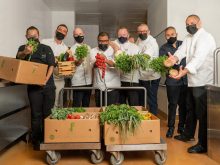 Yousuf Lootah, Vice Chairman of Dubai Sustainable Tourism said: “Dubai continues to progress towards its goal to be one of the world’s most dynamic and forward-thinking, sustainable tourism destinations, aligned with the “Year of the 50th” announcement from HH Sheikh Khalifa bin Zayed Al Nahyan, President of the UAE. Sustainability is one of the UAE’s four strategic pillars for the next 50 years and Dubai Tourism and Dubai Sustainable Tourism strive to collaborate with stakeholders, partners and private companies to boost wellbeing, act as a steward for nature and the environment, support communities and transform the economic future of the UAE.”
Yousuf Lootah, Vice Chairman of Dubai Sustainable Tourism said: “Dubai continues to progress towards its goal to be one of the world’s most dynamic and forward-thinking, sustainable tourism destinations, aligned with the “Year of the 50th” announcement from HH Sheikh Khalifa bin Zayed Al Nahyan, President of the UAE. Sustainability is one of the UAE’s four strategic pillars for the next 50 years and Dubai Tourism and Dubai Sustainable Tourism strive to collaborate with stakeholders, partners and private companies to boost wellbeing, act as a steward for nature and the environment, support communities and transform the economic future of the UAE.”
Sustainable farming is gathering pace in Dubai. With a large focus on food security and regenerative farming practices, Dubai’s agricultural sector continues to grow with a record number of ecological farms for tourists and locals to visit, as well as take home the fresh produce. The city offers a multitude of opportunities for residents and visitors to support enterprise, as well as providing a new lens through which to experience Dubai.
As vertical farming, including aquaculture and hydroponic farming, become increasingly popular, they are helping the city chart the course towards a more sustainable future. Supporting the UAE’s food security goals , vertical farms are enabling consumers to be closer to their produce. Local produce is taking over the dining table at a number of destinations across the city, with eight of Atlantis, The Palm’s restaurants serving dishes with ingredients grown and harvested in Dubai. Local favourites such as, The Pangolin, The Locale at Andaz Dubai and more are also placing emphasis on using locally grown produce.
“Dubai is a city with a number of local farms. Even amid arid weather conditions, vertical and hydroponic farms make it possible for consumers to enjoy fresh, local produce year-round. A number of celebrated restaurants, chefs and hotels in the city are recognising the importance of using locally sourced ingredients, which are not only better for the environment but also superior in freshness and taste compared to imported goods. We are proud to work closely with the private sector to celebrate locally grown cuisine and champion the farmers who help the UAE realise its ambitious National Food Security Strategy 2051 and employ resilient agricultural practices, while helping maintain natural ecosystems.”
Emma Banks, Vice President, F&B Strategy and Operations, Hilton, EMEA, said, “I am delighted to share that Hilton has partnered with Fresh on Table, an agri-tech platform, to launch Growth of the UAE – a new menu which uses homegrown ingredients to create dishes bursting with freshness. As the UAE sets the stage for Expo and celebrates the Year of the 50th, Growth of the UAE is an important step towards assisting the country’s food security mission, reducing our environmental footprint and providing a great culinary experience to our guests.”
Kelly Timmins, Director of Conservation, Education and CSR at Atlantis, Dubai commented: “At Atlantis, Dubai, we recently launched the Atlantis Atlas Project, our commitment to sustainability. As a large-scale hotel operation with 35 food and beverage outlets, reducing our carbon footprint through responsible operations are important to us and increasingly, to our guests. We are currently running sustainable menus in eight of our restaurants, set to expand further due to their popularity. We source an increasing number of ingredients from a number of hydroponic vertical farms that have been locally, organically, and responsibly sourced, for example microgreens, lettuces, heirloom tomatoes and mushrooms. We work with Fresh on Table, a facilitator which connects customers with local farms, delivering fresh produce on the same day it is harvested. This relationship supports local businesses and helps to ensure that we can supply our restaurants with enough locally grown produce – while minimising waste.”
Some of the local farms in Dubai providing sustainably grown, local produce to restaurant groups and consumers directly include:
Sokovo Vertical Farm, an indoor farm spanning over 100,000 sq ft, is gearing up to establish a vertical farm which will produce thousands of tonnes of leafy greens, fruits and vegetables per year. The hydroponic facility will grow fresh kale, spinach, lettuce, tomatoes, strawberries and melons, providing a number of supermarkets, hotels and restauranteurs in the UAE with fresh and healthy produce.
Badia Farms is the UAE’s first urban vertical farm to grow micro-greens and herbs. Consuming an incredible 90 per cent less water than open field growing, Badia Farms’ vertical farming methods champion sustainable agriculture and provide a number of high profile restaurants such as Coya, Gaia, Tashas and more with locally grown, gourmet quality produce.
Uns Farm in Al Quoz was established to offer residents of the UAE with high quality, farm fresh produce, grown locally within urban spaces. Their harvests include a variety of crops ranging from leafy to micro greens, herbs to fresh fodder, and strawberries to mushrooms, amongst others. The Farm has a vision to supply premium quality produce to hotels, restaurants and cafes, along with airlines, hospitals, schools, supermarkets and hypermarkets in an effort to create a self-sufficient food system in the UAE, while helping offset carbon footprints.
Chef Ben Tobitt co-founded Ben’s Farmhouse to supply local farm-grown produce to hotels across the UAE with salads, sandwiches, desserts and snacks to be used in their coffee shops and cafes. The concept was influenced by the rich diversity and innovations in fresh, local farm-grown produce, coupled with a desire to support local growers and suppliers in the country to showcase the huge steps Dubai and the UAE has made in food security by using locally produced ingredients such as; vegetables, fruit, fish, poultry and dairy. Ben’s Farmhouse will also supply a large food pavilion at Expo, which will give exposure of the products to a larger volume of the visitors and tourists in Dubai.
Oasis Greens is a hydroponics, vertical farm growing fresh leafy greens and herbs in Dubai. Oasis Greens was born out of the desire to increase access to fresh, locally grown produce at par with market prices in addition to investing in sustainable food systems in the UAE. The farm grows all varieties of leafy greens such as rocket, several lettuce varieties, bok choy, and kale. It supplies produce to the country’s restaurants, hotels and groceries within hours of harvesting in the morning.
Emirates Hydroponics Farms aims to promote clean and ethical farming practices to produce fresh, healthy fruits and vegetables. The farm, which opened in 2005, produces vine-ripened hothouse tomatoes, pest-free lettuce and cucumbers and a range of other vegetables grown in greenhouses. By growing produce in a greenhouse, Emirates Hydroponics Farms reduces the need for pesticides, while extending the growing season for local produce. Hydroponic methods used for growing vegetables enable the farm to accurately manage both water and nutrients as required by the plants throughout their growing stage, from when the seeds are first planted through to final harvest.
Desert Organic is an Emirati-owned and run family business producing delicious organic fruit and vegetables. Amongst the 50 types of crops at this four-hectare farm, visitors can purchase kale, celery, capsicums, aubergines, pumpkins and a wide variety of herbs and dates.
Andaz Dubai The Palm partnered with Green Container Advanced Farming to grow its own fresh produce on site. The hotel boasts a 400 sq ft hydroponic organic container farm on its terrace, where it harvests fresh produce such as lettuce, herbs and microgreens. Guests visiting Andaz’s dining concepts including The Locale, Hanami and La Coco will be able to enjoy dishes made with ingredients sourced daily from the farm.
“At Andaz Dubai the Palm we continuously seek new ways to contribute to a more sustainable future in every aspect of our hotel and day to day. Our biggest asset to combat and contribute to the environmental issues, is the implementation of the hydroponic organic chamber. A way to create a more efficient crop production, delivering fresh and natural ingredients to our guests in all dishes throughout our dining venues. We continue to commit to a more sustainable future on a daily basis, with multiple initiatives to reduce single use plastic and the use of environmentally friendly products, such as our wooden key cards,” said Malek Safa, Hotel Manager at Andaz Dubai the Palm.
 Tourism Breaking News
Tourism Breaking News


